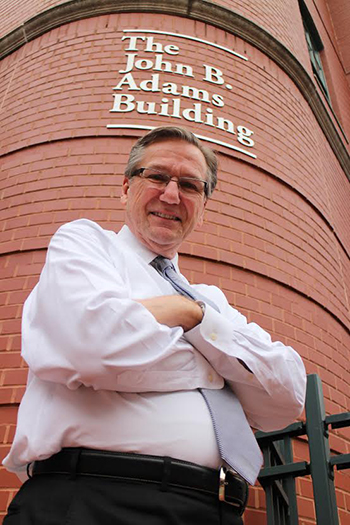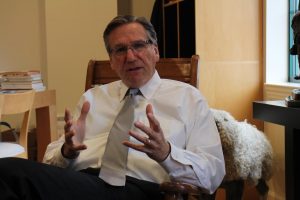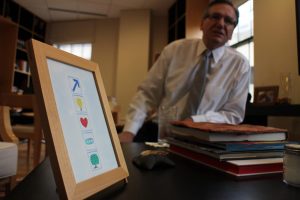
The Martin Agency’s building was named in honor of Adams during a ceremony last month. Photos by Jonathan Spiers.
On John Adams’ desk is a drawing he made of five symbols that he says sum up his job description over 41 years at The Martin Agency.
The first symbol, an arrow, signifies growth and business development. Below that is a light bulb, for the ideas side of the business. In the middle is a heart, representing community. Next is a chain link, for the agency’s client relationships, and, finally, a tree, representing abundance – in financial management and otherwise, he said.
Adams, who officially retired Tuesday as The Martin Agency’s chairman, said those symbols have guided his goals for Martin over the four decades he’s been a part of the company. In that time, the agency, which recently celebrated its 50th year, received awards and acclaim that culminated last year with its first Grand Prix in Film from the prestigious Cannes Lions festival in France, for an online pre-roll ad titled “Family” from insurance company Geico’s “Unskippable” campaign.
Adams said Martin has also been a leader on the business side of things, developing “a tight discipline” on financials that has resulted in earnings over the past 20 years that he described as superior in the industry.
In recognition of his contributions, the agency recently named its Shockoe Slip headquarters for Adams, whose name is now displayed on its red-brick façade.
Richmond BizSense sat down with Adams the day before his retirement to discuss what he has learned, his approach to balancing business and creativity, and why the Geico Gecko remains one of his favorite campaigns. Below is an edited transcript:
Richmond BizSense: You learned the business under the tutelage of Martin Agency founder David Martin. What was a lesson you learned from him?
John Adams: I learned there isn’t any such thing as a boring business or a boring category. You just have to find the liveliness; you have to find the flair. It’s always there. That was a big, important lesson to pick up early.
RBS: In light of the impact Martin has had on the Richmond ad scene, how have you seen the agency’s role in the local creative community?
JA: What I think our role should be and what we’ve tried to make it is a catalyst for the growth of some other agencies. I think (ND&P’s) Jimmy Ashworth talked about this: It’s not good for Richmond to have one big advertising agency and then a lot of other smaller advertising agencies. It’s not good for The Martin Agency, because when we’re recruiting someone to come here from New York or London or San Francisco, it’s a big commitment: they’ve got to pull up stakes, take their wife and their kids and move to Richmond, Virginia, and there’s only one game in town in terms of a big agency, so if it doesn’t work out and they want to work at a big agency, they’ve got to pull up stakes again. But it would be better if there were two, three, five big agencies in Richmond, so that talent looks at Richmond and says, “Oh yeah, of course: Richmond – that’s a creative center, an advertising center.”
RBS: It must have been tempting to move to a larger market. What’s kept The Martin Agency in Richmond?
JA: We love it here. We have thought about it, we’ve had it suggested to us, and we deeply considered it for about 90 seconds. This is just a great place to live, and the people who work here like living here.

‘I’m particularly bothered when young people say, “I’m interested in advertising, but I’m not very creative.” If we all knew what we were really capable of, we’d probably be frightened by it.’
RBS: Does the company have any rituals to get creative? How do you come up with the ideas that have driven your work?
JA: One thing that we do here that is different from what’s done at most agencies is, as ideas are being developed, whether they are strategic ideas or creative ideas, they’re put on the wall immediately. We’ve got miles of these walls that you can write on them, stick things on them, and everything goes up there, and so it’s out in the open. And that means that other people can contribute. The understanding is that if you go by and you see something that you think is wonderful, you’re going to say so, and if you see something that doesn’t work or you’ve got a better idea, then your job is to go and say in a positive, constructive way: what if you tried this? That has unleashed a lot of creativity.
RBS: How do you encourage others to get into the creative frame of mind?
JA: I think the most important thing is to ask for big ideas: “We want something that is dazzling. We want something that’s different from anything that’s ever been done in that business before. We want something that is big; we want to swing for the fences.” And if one has cultivated an atmosphere where there is some trust, then people are less afraid to take big chances, because they’re less likely to think they’ll get fired if it doesn’t work. So not having a fear of failure is important. People aren’t creative when they’re frightened. That has guided me in my personal projects as well: “What’s the worst that can happen? Let’s just swing for it and see.” Obviously, if you fail every day, we’re going to have to talk, but if you fail occasionally in the pursuit of something big, that’s okay.
RBS: Do you have a personal favorite account or campaign that Martin has created?
JA: One of my personal favorites was one of the earlier Geico commercials, and it’s the Gecko – the Gecko is speaking to the audience, and the Gecko says, “You know, people can save money on their car insurance and it’s really easy, so why would you not make a quick phone call or go online?” That’s like if I were to say to you: “You know, you could save a lot of money if you just stand up.” It’s humorous, but what appealed to me about it was it was the right combination of personality, entertainment value, all of those things, and an absolute laser focus on the promise of Geico. The Gecko was saying something that was really smart, in addition to saying it in a way that was funny. And I think when the Geico advertising or any other advertising hits that mix right, it’s really magic.
RBS: Have there been some local campaigns that stand out as things that really got your attention?
JA: Doug Burford’s agency (Burford Advertising) through the years has been the most consistent in surprising you with wonderful advertising that is lively and is so different from local advertising. There are some agencies coming along, like West Cary Group – Moses Foster’s agency – which I think has enormous potential, so we’re eager to help them grow and we’re actually referring some business to them right now.
RBS: Do you have a particular piece of advice that you would give to someone in the industry following in your footsteps?
JA: What I’ve found that I love most about the job is watching people in the company do things that they never believed themselves capable of doing. My advice, and I give this advice a lot, is to take it on faith until you prove otherwise – take it on faith that you are capable of achieving great things, things that you don’t think that you really are capable of achieving.
If we all knew what we were really capable of, we’d probably be frightened by it. I’m particularly bothered when young people come in here and say, “I’m interested in advertising, but I’m not very creative.” It turns out that’s just wrong, that’s incorrect. There’s so much science around this. Everybody is creative – everybody. Creativity is a set of habits of thinking – that’s all it is. And like all habits, they can be learned and practiced.
Part of the job that I feel we have had here over the past 20 years is to ask for great things from people who we know good and well are capable of doing great things, and watching them surprise themselves. Our greatest limitation as human beings is not what we’re not capable of; it’s what we don’t think we’re capable of.

The Martin Agency’s building was named in honor of Adams during a ceremony last month. Photos by Jonathan Spiers.
On John Adams’ desk is a drawing he made of five symbols that he says sum up his job description over 41 years at The Martin Agency.
The first symbol, an arrow, signifies growth and business development. Below that is a light bulb, for the ideas side of the business. In the middle is a heart, representing community. Next is a chain link, for the agency’s client relationships, and, finally, a tree, representing abundance – in financial management and otherwise, he said.
Adams, who officially retired Tuesday as The Martin Agency’s chairman, said those symbols have guided his goals for Martin over the four decades he’s been a part of the company. In that time, the agency, which recently celebrated its 50th year, received awards and acclaim that culminated last year with its first Grand Prix in Film from the prestigious Cannes Lions festival in France, for an online pre-roll ad titled “Family” from insurance company Geico’s “Unskippable” campaign.
Adams said Martin has also been a leader on the business side of things, developing “a tight discipline” on financials that has resulted in earnings over the past 20 years that he described as superior in the industry.
In recognition of his contributions, the agency recently named its Shockoe Slip headquarters for Adams, whose name is now displayed on its red-brick façade.
Richmond BizSense sat down with Adams the day before his retirement to discuss what he has learned, his approach to balancing business and creativity, and why the Geico Gecko remains one of his favorite campaigns. Below is an edited transcript:
Richmond BizSense: You learned the business under the tutelage of Martin Agency founder David Martin. What was a lesson you learned from him?
John Adams: I learned there isn’t any such thing as a boring business or a boring category. You just have to find the liveliness; you have to find the flair. It’s always there. That was a big, important lesson to pick up early.
RBS: In light of the impact Martin has had on the Richmond ad scene, how have you seen the agency’s role in the local creative community?
JA: What I think our role should be and what we’ve tried to make it is a catalyst for the growth of some other agencies. I think (ND&P’s) Jimmy Ashworth talked about this: It’s not good for Richmond to have one big advertising agency and then a lot of other smaller advertising agencies. It’s not good for The Martin Agency, because when we’re recruiting someone to come here from New York or London or San Francisco, it’s a big commitment: they’ve got to pull up stakes, take their wife and their kids and move to Richmond, Virginia, and there’s only one game in town in terms of a big agency, so if it doesn’t work out and they want to work at a big agency, they’ve got to pull up stakes again. But it would be better if there were two, three, five big agencies in Richmond, so that talent looks at Richmond and says, “Oh yeah, of course: Richmond – that’s a creative center, an advertising center.”
RBS: It must have been tempting to move to a larger market. What’s kept The Martin Agency in Richmond?
JA: We love it here. We have thought about it, we’ve had it suggested to us, and we deeply considered it for about 90 seconds. This is just a great place to live, and the people who work here like living here.

‘I’m particularly bothered when young people say, “I’m interested in advertising, but I’m not very creative.” If we all knew what we were really capable of, we’d probably be frightened by it.’
RBS: Does the company have any rituals to get creative? How do you come up with the ideas that have driven your work?
JA: One thing that we do here that is different from what’s done at most agencies is, as ideas are being developed, whether they are strategic ideas or creative ideas, they’re put on the wall immediately. We’ve got miles of these walls that you can write on them, stick things on them, and everything goes up there, and so it’s out in the open. And that means that other people can contribute. The understanding is that if you go by and you see something that you think is wonderful, you’re going to say so, and if you see something that doesn’t work or you’ve got a better idea, then your job is to go and say in a positive, constructive way: what if you tried this? That has unleashed a lot of creativity.
RBS: How do you encourage others to get into the creative frame of mind?
JA: I think the most important thing is to ask for big ideas: “We want something that is dazzling. We want something that’s different from anything that’s ever been done in that business before. We want something that is big; we want to swing for the fences.” And if one has cultivated an atmosphere where there is some trust, then people are less afraid to take big chances, because they’re less likely to think they’ll get fired if it doesn’t work. So not having a fear of failure is important. People aren’t creative when they’re frightened. That has guided me in my personal projects as well: “What’s the worst that can happen? Let’s just swing for it and see.” Obviously, if you fail every day, we’re going to have to talk, but if you fail occasionally in the pursuit of something big, that’s okay.
RBS: Do you have a personal favorite account or campaign that Martin has created?
JA: One of my personal favorites was one of the earlier Geico commercials, and it’s the Gecko – the Gecko is speaking to the audience, and the Gecko says, “You know, people can save money on their car insurance and it’s really easy, so why would you not make a quick phone call or go online?” That’s like if I were to say to you: “You know, you could save a lot of money if you just stand up.” It’s humorous, but what appealed to me about it was it was the right combination of personality, entertainment value, all of those things, and an absolute laser focus on the promise of Geico. The Gecko was saying something that was really smart, in addition to saying it in a way that was funny. And I think when the Geico advertising or any other advertising hits that mix right, it’s really magic.
RBS: Have there been some local campaigns that stand out as things that really got your attention?
JA: Doug Burford’s agency (Burford Advertising) through the years has been the most consistent in surprising you with wonderful advertising that is lively and is so different from local advertising. There are some agencies coming along, like West Cary Group – Moses Foster’s agency – which I think has enormous potential, so we’re eager to help them grow and we’re actually referring some business to them right now.
RBS: Do you have a particular piece of advice that you would give to someone in the industry following in your footsteps?
JA: What I’ve found that I love most about the job is watching people in the company do things that they never believed themselves capable of doing. My advice, and I give this advice a lot, is to take it on faith until you prove otherwise – take it on faith that you are capable of achieving great things, things that you don’t think that you really are capable of achieving.
If we all knew what we were really capable of, we’d probably be frightened by it. I’m particularly bothered when young people come in here and say, “I’m interested in advertising, but I’m not very creative.” It turns out that’s just wrong, that’s incorrect. There’s so much science around this. Everybody is creative – everybody. Creativity is a set of habits of thinking – that’s all it is. And like all habits, they can be learned and practiced.
Part of the job that I feel we have had here over the past 20 years is to ask for great things from people who we know good and well are capable of doing great things, and watching them surprise themselves. Our greatest limitation as human beings is not what we’re not capable of; it’s what we don’t think we’re capable of.

Mr. Adams makes a great point about relocating creatives. I just wish it had been gender neutral. “It’s not good for The Martin Agency, because when we’re recruiting someone to come here from New York or London or San Francisco, it’s a big commitment: they’ve got to pull up stakes, take their wife and their kids and move to Richmond, Virginia . . . ” There still feels like there’s gender discrimination is advertising – especially in the creative areas. (Ex. J. Walter Thompson’s chief exec Gustavo Martinez resignation) All that being said I wish Mr. Adams a happy retirement.… Read more »